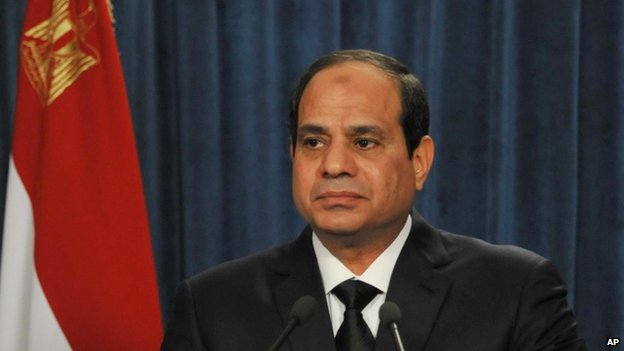Egypt president says need growing for joint Arab force

Egypt’s President Abdel Fattah el-Sisi has said that the need for a joint Arab military force is growing every day as the region faces the escalating threat of armed factions.
Sisi also said on Sunday in a recorded address aired by state television that Egypt’s military has no interest in invading or attacking other nations, but will defend Egypt as well as the region “if required and in coordination with our Arab brothers”.
“The need for a unified Arab force is growing and becoming more pressing every day,” the president said.
The soldier-turned-politician said both Jordan and the United Arab Emirates have offered to dispatch military forces to aid Egypt following last week’s beheading in Libya of 21 Egyptian Coptic Christians by fighters pledging allegiance to the Islamic State of Iraq and the Levant group (ISIL).
Commentary: Al Jazeera’s Senior Political Analyst Marwan Bishara
President Sisi’s highly produced and carefully packaged speech about Egypt’s state of affairs was terribly detailed but notoriously selective.
Sisi spoke only of “achievements” since he took office seven months ago and of the many challenges facing Egypt. Among the achievements he detailed is a $6bn arms deal with France. Buying jet fighters Egypt doesn’t need with money it doesn’t have to impress those who won’t be impressed!
He spoke softly and deliberately, but neglected to talk about the political turmoil in the country.
The speech covered everything from air strikes in Libya to rice distribution but not a vision or a strategy to get Egypt out of its miserable conditions.
It’s the state of his presidency.
Egyptian warplanes struck ISIL positions in the eastern Libyan city of Derna early on Monday, just hours after the release of a video showing the beheadings. Sisi said in his address that the warplanes struck 13 targets which had been “carefully surveyed and studied”. He gave no further details.
The Egyptian president’s assertion that a joint Arab military force was needed was the first public confirmation by an Arab leader that the creation of such a force was a possibility.
Last November, The Associated Press news agency reported that Egypt, Saudi Arabia, the United Arab Emirates and Kuwait were discussing the creation of a military pact to take on armed groups, with the possibility of a joint force to intervene around the Middle East.
Last week, security and military officials said discussions of the plan were back on track after a hiatus, with Jordan, France, Italy and Algeria now viewed as possible additional partners.
Sisi also suggested that a leaked recording in which he and aides purportedly derided powerful Arab Gulf donors had been fabricated, after an opposition-linked television station aired the tape.
After the release of the recording earlier this month, Sisi called several Gulf Arab leaders who had donated billions of dollars to Egypt to express his support for them.
Muslim Brothood ‘militant’ charges
The Egyptian president also promised to release young people who may have been wrongly jailed during Egypt’s crackdown on the opposition since he overthrew his Islamist predecessor in 2013.
Sisi’s statement on Sunday came after Egypt’s public prosecutor said he had referred 215 members of the outlawed Muslim Brotherhood to trial on charges of forming a “militant group”, the latest move in a sustained crackdown by authorities on armed factions.
Egypt has mounted one of the biggest crackdowns in its recent history on the Brotherhood following the army’s overthrow of President Mohamed Morsi in 2013 after mass protests against his rule.
The 215 defendants were charged with forming an armed group called “Helwan Brigades”, Hesham Barakat, the public prosecutor, said in a statement on Sunday. Helwan is a district in southern Cairo.
The prosecution’s investigation said that the group was responsible for killing at least six policemen and wounding several civilians and policemen in separate attacks in Cairo. The group also had possessed weapons and ammunition.
Of the group, 125 members are in detention, and Barakat ordered the arrest of those at large.
Thousands of Brotherhood supporters have been arrested and put on mass trials in a campaign which human rights groups say shows the government is systematically repressing opponents.
Source: Agencies